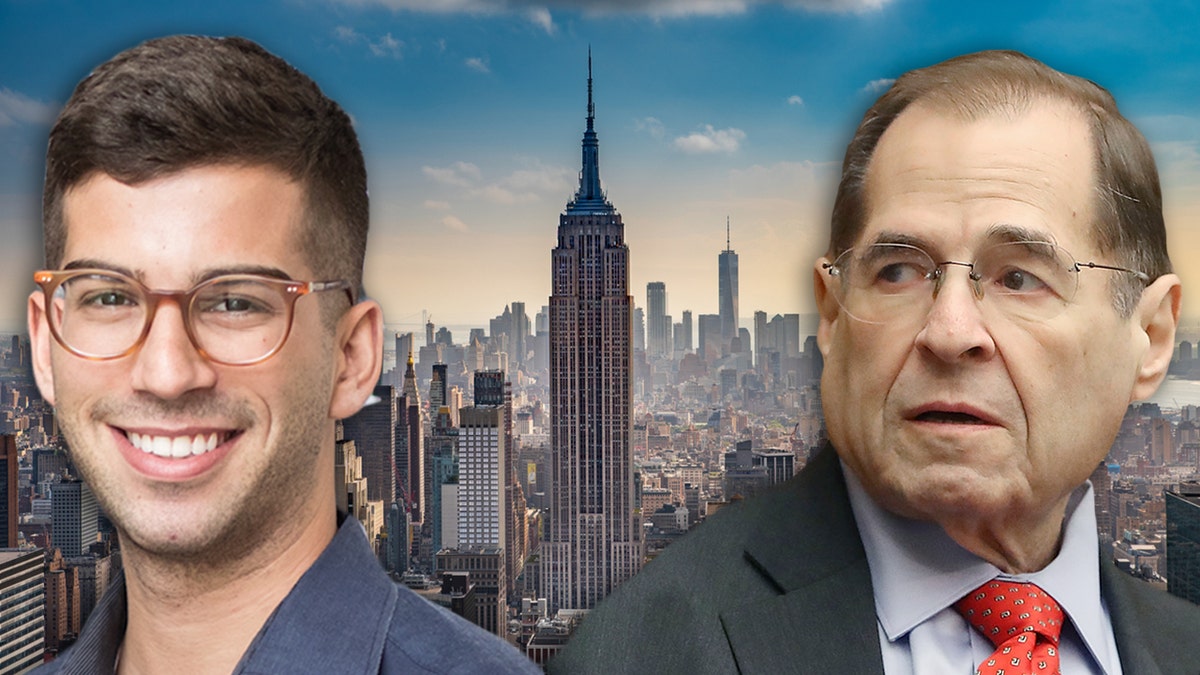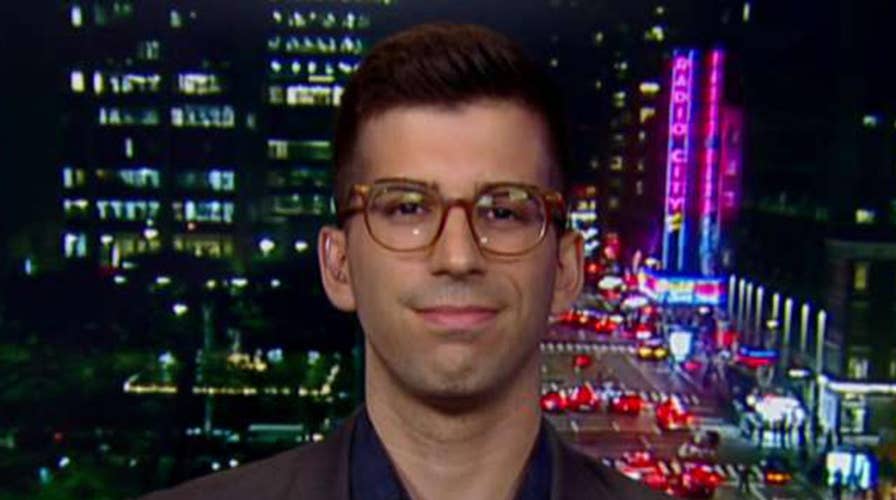Former Andrew Yang staffer challenging Rep. Nadler in 2020
Candidate Jonathan Herzog discusses his goal to unseat House Judiciary Committee chairman Nadler on 'The Ingraham Angle.'
Get all the latest news on coronavirus and more delivered daily to your inbox. Sign up here.
Media Angle offers unique perspectives on today's media landscape from the newsmakers themselves.
Harvard Law School student Jonathan Herzog once described himself as "politically homeless." Then he was introduced to Andrew Yang's 2020 presidential candidacy and had a political awakening, which he described on his website as a "hypnic jerk," "that sudden feeling of falling that we jump awake to sometimes as we’re falling asleep."
Herzog was so inspired by Yang's "Humanity First" message that he left law school to join the then little-known businessman, and was quickly hired as the campaign's Iowa campaign coordinator.
The 24-year-old member of the "Yang Gang" felt so passionately about policies like the Universal Basic Income (UBI), which guarantees $1,000 to every American adult, that he left the campaign to launch his own congressional bid last fall in hopes of enacting such policies on Capitol Hill.
GOP CANDIDATE DALIA AL-AQIDI ON CHALLENGING ILHAN OMAR, BEING IGNORED BY MAINSTREAM MEDIA
The self-described "Freedom Democrat" hopes to defeat 72-year-old Rep. Jerry Nadler in New York's 10th District on June 23 and be elected as the youngest lawmaker at 25 years old (his birthday is in May), breaking the record of Rep. Alexandria Ocasio-Cortez, who was 28 when she was elected to Congress in 2018.
Speaking to Fox News' Media Angle, Herzog talks about the mistreatment he thinks Yang received from the mainstream media, the influence of social media in politics, and the obstacles he faces while campaigning during the national crisis brought upon by the coronavirus outbreak.

MEDIA ANGLE: How do you think the mainstream media treated Yang campaign? Were they fair? Dismissive?
JONATHAN HERZOG: The #YangMediaBlackout was empirically undeniable. Tragically, only the present crisis of the COVID-19 pandemic seems to have catapulted the campaign's ideas so far into the mainstream, garnering support from the likes of the Trump administration, Sen. Mitt Romney, and Rep. Alexandria Ocasio-Cortez.
MA: You mention the #YangMediaBlackout. What do you think was behind it?
HERZOG: Institutions, especially the news media, operate by a certain set of incentives, guided by a set of institutional gatekeepers. Yang was a heterodox outsider, not a politician, and was calling out a host of structural challenges that for the most part, they had failed to cover, including the fourth industrial revolution, deaths of despair, and some of the critical underlying macroeconomic forces behind Trump's win, as well as a host of solutions such as universal basic income that had largely been erased from mainstream consciousness since the 1970s. He didn't speak in traditional political terms, subscribe to partisan orthodoxy, lean heavily into identity politics, or engage in the typical personal attacks and negative advertising that drive clicks.
DONALD TRUMP JR. ON DEFENDING HIS FATHER, CHALLENGING MEDIA HYPOCRISY: 'I KIND OF ENJOY THE FIGHT'
[The #YangGang is] an entrepreneurial, gritty, and scrappy bunch, and so the campaign burst on to the national scene and qualified for the Democratic debates largely without mainstream press coverage, which to a set of institutional gatekeepers can be confusing. Media companies were also facing some of these structural challenges of the digital age themselves, such as competition in the form of alternative media, social media, and long-form podcasting. For 60 years, we have lived in the age of the televised presidential election. This year, for the first time, networks couldn't keep a candidate from making the debate stage, but for the last time, they decided who stayed.
MA: Many have compared the Trump administration's coronavirus relief of sending checks to Americans to Yang's signature UBI policy. Why do you think such an idea is being treated more seriously now than during Yang's run?
HERZOG: It was Milton Friedman in 1962 who said: "Only a crisis - actual or perceived - produces real change. When that crisis occurs, the actions that are taken depend on the ideas that are lying around. That, I believe, is our basic function: to develop alternatives to existing policies, to keep them alive and available until the politically impossible becomes politically inevitable." Our economy is grinding to a halt with soaring unemployment rates due to this pandemic, and we have to do all we can to avoid a full-on depression. Before COVID-19, most Americans still lived paycheck to paycheck and had little to no savings. In the midst of this pandemic, more and more elected officials are realizing that in order to keep the economy afloat, people need cash now, and that means-testing will leave millions of people behind and introduce administrative hurdles that we don't have time for.
MA: What do you think of the media coverage Jerry Nadler receives? Do you think the media has been favorable to him as a prominent Democrat in Trump's impeachment?
HERZOG: Rep. Nadler played a central role in the impeachment proceedings, so he received commensurate coverage. Whether it's been favorable definitely depends on which news sources you follow most closely.
PRO-TRUMP MEME KING CARPE DONKTUM EXPLAINS HIS MEDIUM: 'HATE IS A POISON TO COMEDY'
MA: What challenges do you face as a primary challenger against an establishment giant like Nadler?
HERZOG: The main thing is just introducing myself and our vision to tens of thousands of people across the district, which will have to happen online over the coming weeks. Once people get to know me and hear more about why we're running they tend to get excited about new blood and a fresh vision for New York.
MA: What kind of impact has social media had on politics? Do you think it has helped or hurt civil discourse?
HERZOG: Social media has definitely redefined the political landscape in many ways. Politicians can speak directly to the people and sidestep institutional gatekeepers to an extent. Overall, though, the research on the effects of social media on the spread of disinformation, information silos, and its contribution to anxiety and depression, especially among younger people, is of great concern. One of the awesome things about the Yang Gang is that we have somehow mostly used social media as a positive force for civil discourse, and that's in large part thanks to Andrew's leadership by example.

MA: How do you think the media has handled the coronavirus coverage?
HERZOG: There's definitely been an evolution over the past number of days in particular as it relates to media coverage of the coronavirus. I think the most important thing now is shining a light on the importance of a universal emergency cash stimulus, as well as the key differences between mitigation and suppression strategies - we need to think much bigger and act much faster than we have been. We can fight this pandemic head-on together and control it until we develop a vaccine, but only if we go beyond mere mitigation.
CLICK HERE FOR COMPLETE CORONAVIRUS COVERAGE
MA: How has your campaign been able to function amid this national emergency?
HERZOG: We thankfully have an incredibly nimble army of digitally-native volunteers that is second to none and ready to fight for the 15,000 votes needed to unseat Rep. Nadler and win the June 23rd primary. Yet, this national emergency extends far beyond our campaign - organizations such as Humanity Forward and GiveDirectly are helping provide cash relief, and most importantly, we need Congress to pass an emergency stimulus now.


